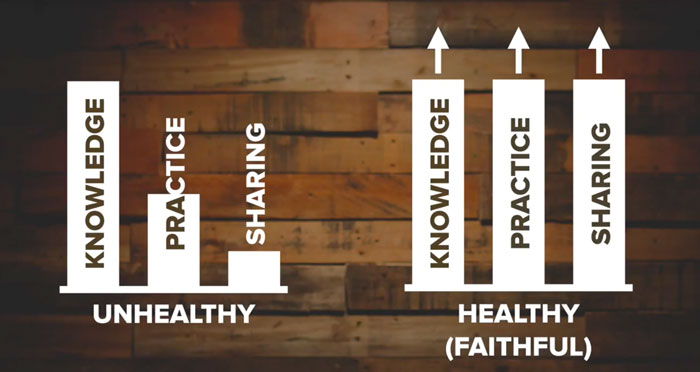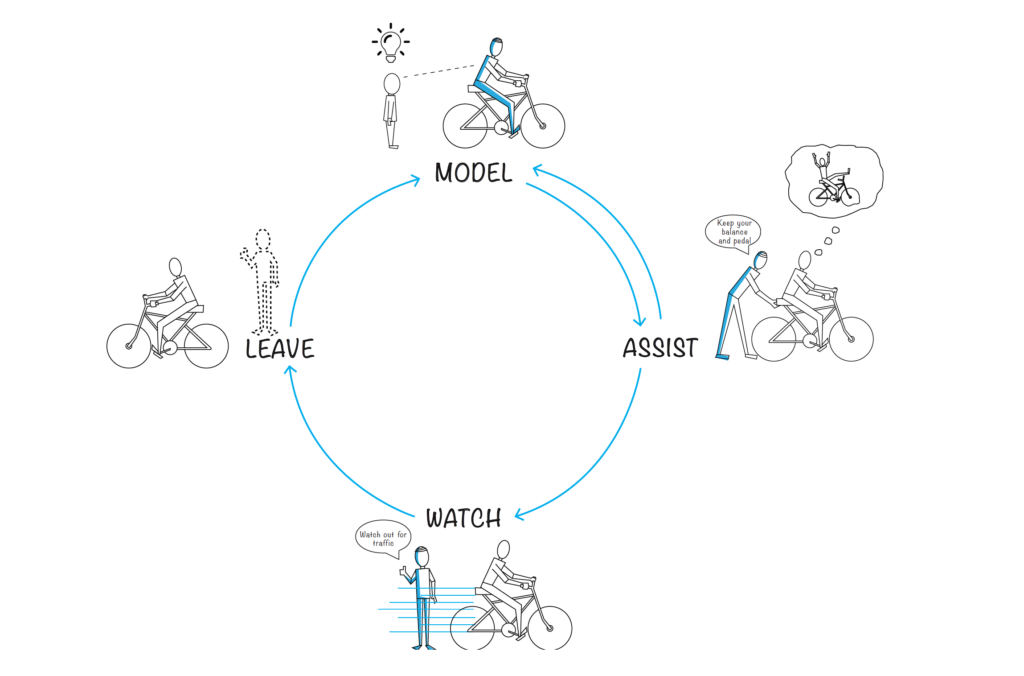Often people are concerned about the possibility of heresy in a movement like this and that’s understandable. You have new believers who are leading other, even newer believers, you know up to the point where they’ve come and so on. But often I think we’re too concerned about orthodoxy and not enough concern about orthopraxy.

Orthodoxy is right belief and that’s important. It’s important that we have proper beliefs, but very often in our churches, we have believers who may believe the right things but they don’t live what they know.
This goes back to keeping in balance: belief or knowledge, practice or obedience, and sharing or teaching. We need to be concerned about all of these aspects.
It’s absolutely true that new believers often make errors in interpreting and applying Scripture. This can be illustrated by a diagram.

In this diagram where the the cross occurs is the point where this person comes to faith and then to the right it’s a timeline. The horizontal line represents truth — accurate interpretation of Scripture — and then the big wavy line that indicates there’s deviance from that truth. These deviations would be miss interpretations of Scripture — wrong beliefs.
Early in a Christian’s life, those can happen frequently and can be fairly significant in nature, but if they are being discipled in the manner that we’ve been talking about — including being equipped to interpret and apply scripture — fairly quickly over time, these deviances become fewer and less extreme. So that typically, within even a year, these become very minor and relatively insignificant.
We need to be aware that this misinterpretation of Scripture is not unique to people in movements like this. Actually in our churches today, in the United States, there are lots of inaccurate beliefs. The difference is in the disciple making movements these become evident because these people are talking. We’re hearing from them. We’re hearing the inaccurate things that they believe and those are becoming evident. Whereas in our churches, we’re not hearing from them.
The assumption is that whatever the pastor says … this is what the people understand and believe. This isn’t true.
The assumption is whatever the pastor says, this is what the people understand and believe. This isn’t true. We see from research, such as some of Barnes well-known research, that American Christians are far from having a biblical worldview. We never hear from them. They’re not being equipped to interpret and apply Scripture. So they continue in this state of having inaccurate or inadequate beliefs and this situation doesn’t improve over time.
Perhaps even more alarming is the fact that Barnes research also indicates that American pastors have alarming gaps between their beliefs and Scripture — between biblical worldview and their worldview — so even if the people did understand and believe what the pastors we’re telling them, there could still be mistakes.
I think though, that again, orthodoxy is important, but orthopraxy is more important. Because orthopraxy is how we live out what we believe — right practice. So if we will concern ourselves not just with orthodoxy but also with orthopraxy and with sharing with others, then it becomes even more obvious that the type of multiplication movements that we’re talking about are actually far healthier.

disciple making movement training
online, free @ Zúme.Training
I had the opportunity to serve for some time as the vice president for global strategy with the Southern Baptist international mission board. When I was in that position, part of my responsibility was to be over the global research department which is a globally recognized expert in missions research.
We investigated many movements that had the characteristics like we’ve been discussing and in those movements we did multiple, in fact, numerous in-depth interviews — 360 degree. Where we’re evaluating new believers, older believers, leaders, non-christians living in the area, other Christians living in the same area, where these movements were taking place and tried to evaluate not just quantitative data but qualitative data about these rapidly growing movements. The bottom line is we’ve never found any significant heresy problems in these movements.
The bottom line is we’ve never found any significant heresy problems in these movements.
While I was there, we looked at a dozen different movements in a variety of context. We had in the team’s investigating and studying these movements came from multiple countries and denominations to remove bias.
The most serious error that we found was among the Quay people in Arisa, India, and they delayed baptism up to a year for new converts. Is this biblical? No. Is it right? No. But is it a critical heresy? I don’t think so. I view this not as a primary issue or even a secondary issue but a tertiary issue. Now this isn’t to say you can’t have heresies in a movement like this, of course you can, but it is to say that they’re not typical. So if you’re equipping every disciple to be self-feeding in the ways we’ve talked about and you’re implementing the training cycle, over time, the probability of there being a heresy is actually far less than in more traditional movements.

This goes back to the idea of the training cycle. You remember we illustrated that with a parent teaching a child to ride a bicycle. Well in the church, we want to model and model and model. And if we ever do assist, then we’re scared to let go of the bicycle for a long, long time because we want to make sure they don’t fall down.
These are eternal matters! This is important! We don’t want them to get hurt; we don’t want others to get hurt; we don’t want mistakes to be made. How would that reflect on God? How would that reflect on his church?
So as a result, we continue to hold on to the bicycle, we hold on we hold on and as long as we’re holding the bicycle they can never learn to ride the bicycle. They have to be allowed to make mistakes. That is how we learn and which of us has never made a mistake in leadership. But yet somehow we survived, the church survived, God survived.
We just need to be willing to allow people to fail so that they can learn.
More Multiplication Concepts
This concept is part of the “Multiplication Concepts” series by Curtis Sergeant. Consider working through the entire series and challenging someone you know to do it with you. See an entire list of the concepts in the article titled “Multiplication Concepts”.
This same concept is taught in the Zúme Training course using video animation and is translated into 40 languages. This concept is taught in session 7 of the Zúme Training called “Training Cycle for Maturing Disciples”.
Zúme Training is an on-line and in-life learning experience designed for small groups who follow Jesus to learn how to obey His Great Commission and make disciples who multiply.
